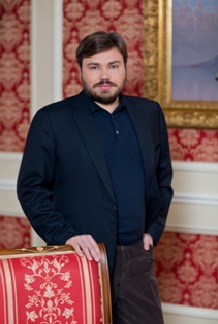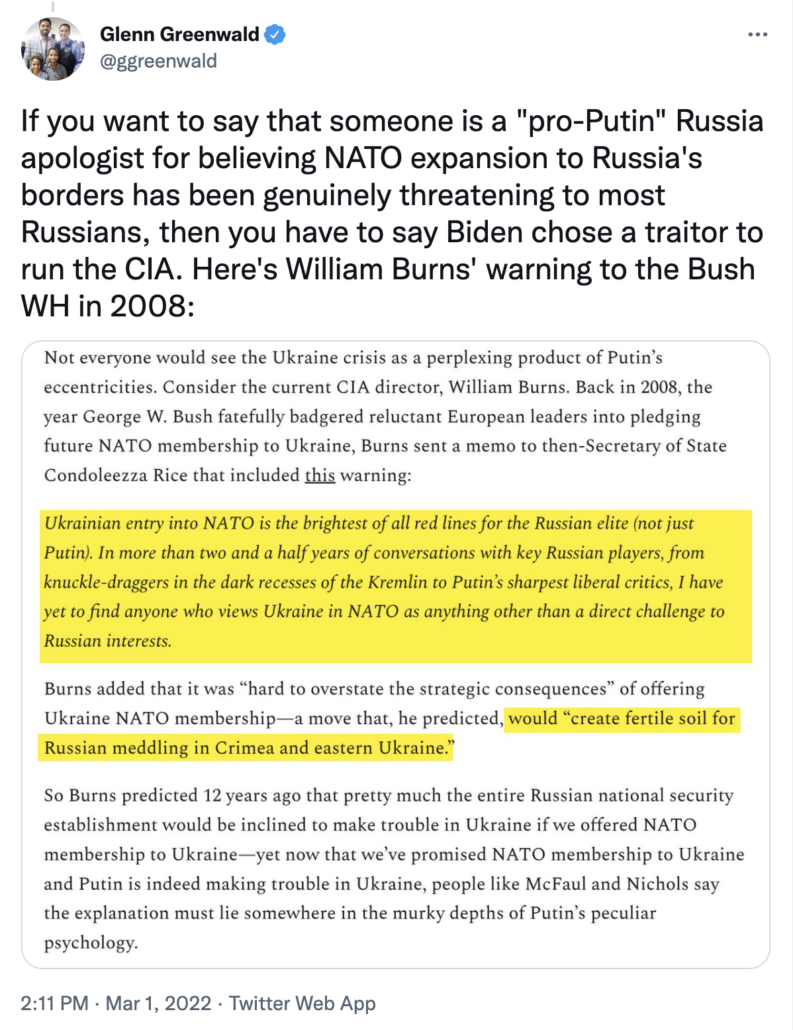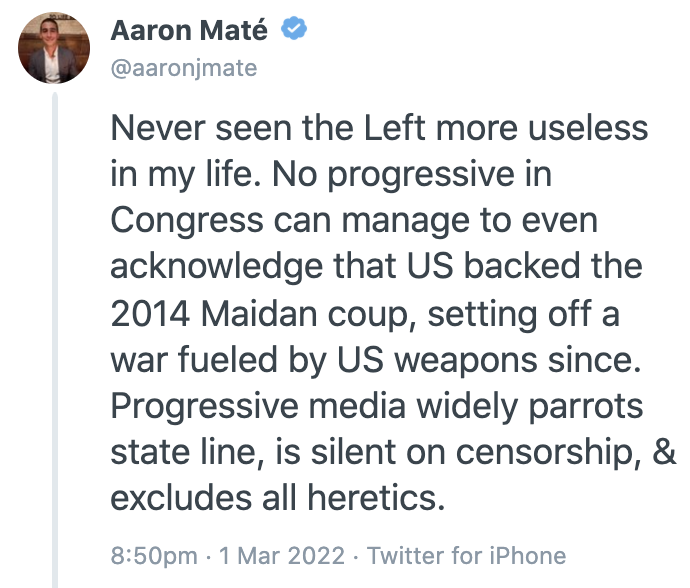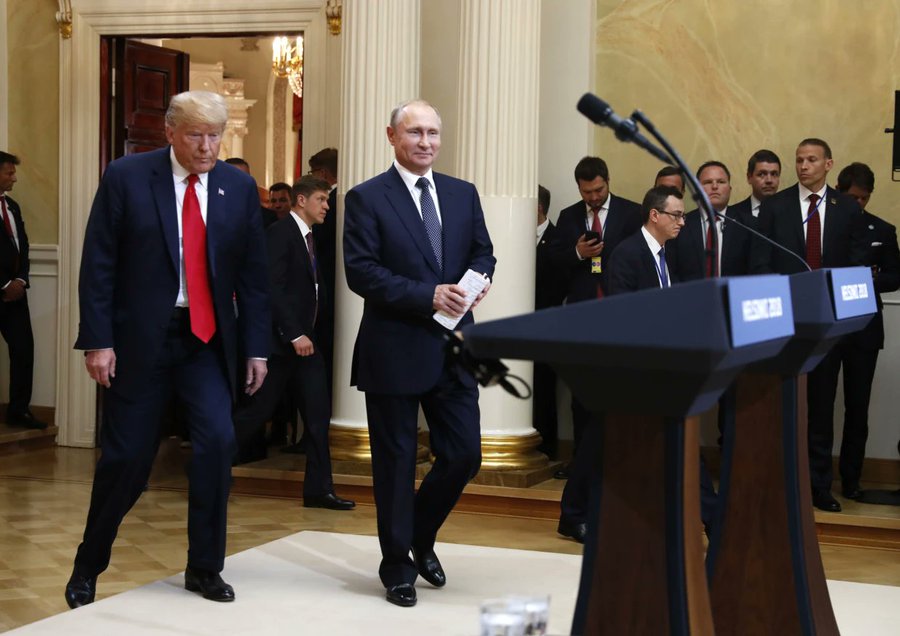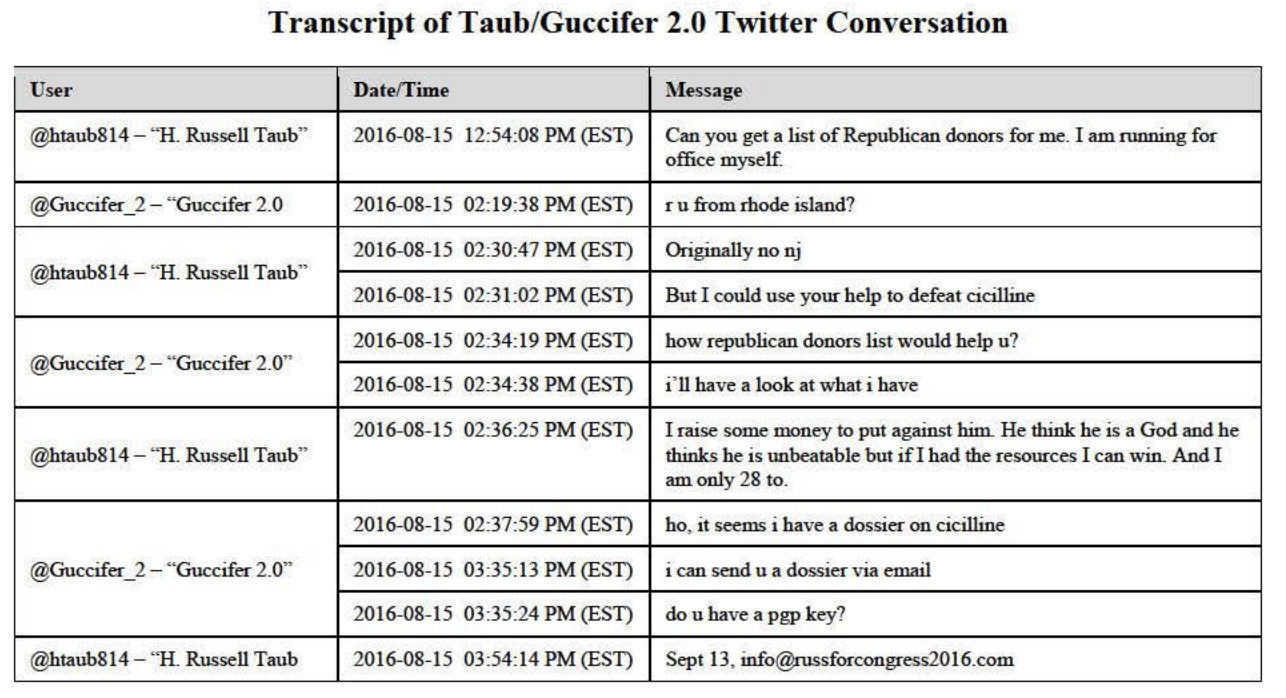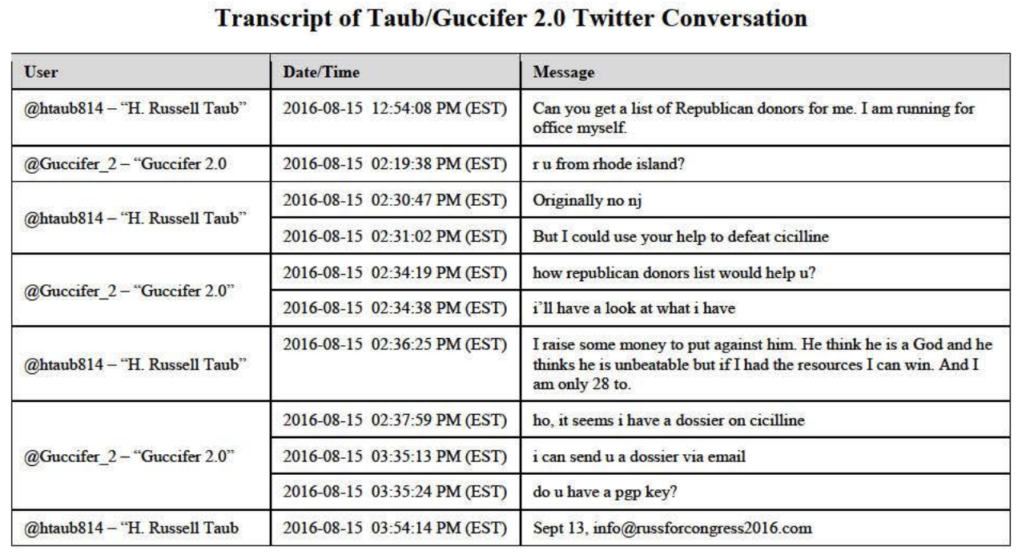In a DC hearing on February 9 regarding Alfa Bank’s attempt to obtain documents from Michael Sussmann before his trial, DC Superior Judge Shana Frost Matini observed that the Alfa Bank allegations and the John Durham indictment seemed like they could be written by the same people.
[R]ight now, given the — if the closeness of Alpha’s allegations, I mean, quite frankly, it’s — reading Alpha’s submissions and what the — and that compared to the indictment, there’s — it’s almost like they were written by the same people in some way. [Alpha misspelling original]
Judge Matini, a Trump appointee, scolded Alfa — which over this past weekend was included in sanctions against Russian banks in retaliation for the invasion — for claiming that their lawsuit and Durham’s indictment of Sussmann were not closely related after having raised the indictment in the first place.
As to the claims that the criminal and civil proceedings are not closely related, this is a surprising representation for Alpha to make, given that Alpha was the one to bring the criminal charges to the Court’s attention by filing what was styled as a notice of supplemental authority in support of its Motion to Compel.
Of course, there is no Supplemental Authority here. A criminal indictment is not an opinion of the Court. It’s just a charge that the prosecuting authority is bringing against an individual with facts that are alleged to support the charge.
In dual lawsuits in FL and PA, Alfa Bank purports to be trying to figure out who allegedly faked DNS records to make it look like Alfa was in contact with Trump back in 2016 so it can sue those people. Rather than finding anyone to sue, however, it has instead spent its time subpoenaing experts to learn as much as it can about how the US tracks DNS records to prevent cyberattacks by — among other hostile countries — Russia.
Matini ruled that Alfa’s effort to get more information from Sussmann will have to wait until June, after his trial. (It’s unclear whether the sanctioned bank will still have legal means to pay Skadden lawyers to pursue this lawsuit at that point.)
But since then, the timelines of the Alfa Bank and Durham investigations have closely paralleled.
Of particular interest, on the morning of February 11, Rodney Joffe — referred to as Tech Executive-1 in the Durham filings — sat for an almost 5-hour deposition with Alfa Bank’s lawyers. He revealed that Durham had first approached him for an interview at least a year earlier. He revealed he had been asked to testify before the grand jury, but he “declined to interview,” presumably meaning he told Durham he’d invoke the Fifth (just as Don Jr and probably his daddy are understood to have done with Mueller).
Joffe’s refusal to voluntarily feed this witch hunt continued in his Alfa deposition. Citing the ongoing Durham investigation, he invoked the Fifth Amendment a slew of times (though not as many times as your average Trump man in a financial fraud deposition or even Alex Jones in an interview about an insurrection). Those questions to which he invoked his Fifth Amendment rights and those he answered mapped out an interesting territory, marking who he does know and those Alfa thought he did but that he does not.
For example, he said he had never heard of Alfa Bank before investigating the anomaly related to it. He said he had never met Jean Camp or several of the other researchers that frothers are certain he conspired with. Joffe twice said he had never met Christopher Steele and also said he “had no idea” that Sussmann met with Steele about the server allegations. He denied knowing what the contract between Georgia Tech and DARPA looked like.
Alfa made a number of mistakes — confusing a domain name with a business. Claiming he authored a paper that David Dagon had. Asking him about several emails he hadn’t been sent.
There were several claims Alfa made that Joffe’s lawyer, Steven Tyrrell, established a record were unproven assumptions on Alfa’s part, such as that Joffe got one of the white papers described in the indictment. Importantly, that includes a question about the EOP server.
Q: I was just going to ask Mr. Joffe whether or not he knows who the executive branch office of the U.S. government is?
A: I have to invoke my Fifth Amendment rights.
Mr. Tyrrell: And Margaret, if I may, just — I apologize. Just for the record, I want to be clear that — that in invoking his rights and my allowing my client to invoke his rights, that should not be interpreted as an admission that the — I mean, you’ll argue whatever it is, if you do, that the allegations, which are just allegations in the indictment, are accurate.
In addition to those curious objections, there were several things alleged in the indictment that Joffe outright denied. In several questions, Joffe challenged the meaning of an email Durham has used to suggest he anticipated, and wanted, a top cybersecurity job within a hypothetical Hillary Administration. After objecting to the form of the way the Alfa Bank’s Skadden lawyer tried to corner Joffe into answering the question, Tyrrell answered,
You know, again, our position on this is Mr. Joffe is happy to answer the question that was posed about whether he was ever offered the top cybersecurity job by the Democrats when it looked like they’d win. I think he’s answered that question.
He’s not going to answer questions about communications that he may or may not have had with other people about the topic. And as to those, he would invoke his rights under the Fifth Amendment.
Joffe answered no to three questions about whether the Clinton campaign paid him for his work on the server allegations, a false claim that Kash Patel spread. Joffe also distinguished his concern about Donald Trump from a political desire to see him lose.
I’ve never been interested in politics. I’ve never been involved in politics. I haven’t voted for many, many years. I haven’t donated to any parties or any — or given any kind of benefit to any parties, but I certainly over the last few years have had an interest in the politics of the country that I live in.
That explanation premised two invocations of his Fifth Amendment in response to questions about Trump specifically.
In other words, Joffe’s Alfa Bank deposition on February 11 undermined several of the premises of the Durham investigation, while it identified several areas where his lawyer suggested Alfa’s assumptions were wrong (in the hearing on Laura Seago’s deposition, there was a central Alfa Bank assumption I know to be badly wrong).
Joffe’s deposition ended at 2:07PM ET on February 11.
Nine hours later, at 11:32PM, Durham submitted the belated conflicts motion — which would have been filed in September if Durham really had concerns about any conflict — and floated a number of claims about Joffe, claims that went beyond those in the indictment. Joffe is mentioned twenty times, including the following:
The defendant’s billing records reflect that the defendant repeatedly billed the Clinton Campaign for his work on the Russian Bank-1 allegations. In compiling and disseminating these allegations, the defendant and Tech Executive-1 also had met and communicated with another law partner at Law Firm-1 who was then serving as General Counsel to the Clinton Campaign (“Campaign Lawyer-1”).
The Indictment also alleges that, beginning in approximately July 2016, Tech Executive-1 had worked with the defendant, a U.S. investigative firm retained by Law Firm-1 on behalf of the Clinton Campaign, numerous cyber researchers, and employees at multiple Internet companies to assemble the purported data and white papers. In connection with these efforts, Tech Executive-1 exploited his access to non-public and/or proprietary Internet data. Tech Executive-1 also enlisted the assistance of researchers at a U.S.-based university who were receiving and analyzing large amounts of Internet data in connection with a pending federal government cybersecurity research contract. Tech Executive-1 tasked these researchers to mine Internet data to establish “an inference” and “narrative” tying then-candidate Trump to Russia. In doing so, Tech Executive-1 indicated that he was seeking to please certain “VIPs,” referring to individuals at Law Firm-1 and the Clinton Campaign.
The Government’s evidence at trial will also establish that among the Internet data Tech Executive-1 and his associates exploited was domain name system (“DNS”) Internet traffic pertaining to (i) a particular healthcare provider, (ii) Trump Tower, (iii) Donald Trump’s Central Park West apartment building, and (iv) the Executive Office of the President of the United States (“EOP”). (Tech Executive-1’s employer, Internet Company-1, had come to access and maintain dedicated servers for the EOP as part of a sensitive arrangement whereby it provided DNS resolution services to the EOP. Tech Executive-1 and his associates exploited this arrangement by mining the EOP’s DNS traffic and other data for the purpose of gathering derogatory information about Donald Trump.)
The Indictment further details that on February 9, 2017, the defendant provided an updated set of allegations – including the Russian Bank-1 data and additional allegations relating to Trump – to a second agency of the U.S. government (“Agency-2”). The Government’s evidence at trial will establish that these additional allegations relied, in part, on the purported DNS traffic that Tech Executive-1 and others had assembled pertaining to Trump Tower, Donald Trump’s New York City apartment building, the EOP, and the aforementioned healthcare provider. In his meeting with Agency-2, the defendant provided data which he claimed reflected purportedly suspicious DNS lookups by these entities of internet protocol (“IP”) addresses affiliated with a Russian mobile phone provider (“Russian Phone Provider-1”). The defendant further claimed that these lookups demonstrated that Trump and/or his associates were using supposedly rare, Russian-made wireless phones in the vicinity of the White House and other locations. The Special Counsel’s Office has identified no support for these allegations. Indeed, more complete DNS data that the Special Counsel’s Office obtained from a company that assisted Tech Executive-1 in assembling these allegations reflects that such DNS lookups were far from rare in the United States. For example, the more complete data that Tech Executive-1 and his associates gathered – but did not provide to Agency-2 – reflected that between approximately 2014 and 2017, there were a total of more than 3 million lookups of Russian Phone-Provider-1 IP addresses that originated with U.S.-based IP addresses. Fewer than 1,000 of these lookups originated with IP addresses affiliated with Trump Tower. In addition, the more complete data assembled by Tech Executive-1 and his associates reflected that DNS lookups involving the EOP and Russian Phone Provider-1 began at least as early 2014 (i.e., during the Obama administration and years before Trump took office) – another fact which the allegations omitted.
As I noted, less than a day after Durham filed that motion, the former President suggested that Joffe had been spying and should be killed. In response to the furor, Joffe’s spox later issued a statement clarifying what went on — precisely the information he had tried to plead the Fifth over.
In a statement, a spokesperson for Mr. Joffe said that “contrary to the allegations in this recent filing,” he was apolitical, did not work for any political party, and had lawful access under a contract to work with others to analyze DNS data — including from the White House — for the purpose of hunting for security breaches or threats.
After Russians hacked networks for the White House and Democrats in 2015 and 2016, it went on, the cybersecurity researchers were “deeply concerned” to find data suggesting Russian-made YotaPhones were in proximity to the Trump campaign and the White House, so “prepared a report of their findings, which was subsequently shared with the C.I.A.”
And some of the other researchers had to provide more details to push back on the frenzy (including that the data from EOP preceded Trump’s inauguration). Few outlets, though, have presented the basic innumeracy in Durham’s filing about the rarity of YotaPhones as anything but a contested issue.
And after Durham incited claims that Joffe should be killed, one week later Alfa Bank then affirmed the tie between Joffe and Tech Executive 1 by posting his deposition in their motion to get another four months to conduct their fishing expedition. That has had the effect of further inflaming the frothy right, and providing Durham sworn testimony from Joffe that he was otherwise not entitled to (including several warnings about how his case against Sussmann may be vulnerable).
In the wake of the release of the Florida filing, Joffe’s lawyers intervened in the Sussmann case and then filed a separate sealed motion to strike the (misleading) references to Joffe in the filing.
A Trump appointed judge in DC believes these efforts look like they’re being written by the same people. Whether Durham’s sources and a sanctioned Russian Bank’s sources are “colluding,” these parallel developments had the effect of depriving Joffe of his ability to fully invoke the Fifth Amendment. And with the help of a sanctioned Russian bank, it gave Durham a substantial benefit in a criminal investigation.
Timeline
January 25: Durham asks to extend discovery deadline
January 28: Durham admits that Durham was informed about the James Baker phone he claimed to forget knowing about
February 9: Michael Sussmann succeeds in staying Alfa Bank’s effort to get documents from him
February 10: Fusion GPS’ Laura Seago attempts to quash a subpoena
February 11, 9:30AM: Rodney Joffe deposition
February 11, 11:32PM: Durham files a motion purporting to be a conflicts motion that misrepresents the evidence
February 14: Sussmann asks to strike unsupported allegations in conflicts motion
February 14: Peter Fritsch deposition
February 17: Sussmann moves to dismiss the case, arguing his alleged lie would not be material
February 17: Durham claims that the close associates of the investigation that lied about what the conflicts motion said have nothing to do with the Durham team
February 18: Alfa Bank requests another extension to keep looking for John Does in FL
February 24: Rodney Joffe’s lawyers file notices of appearance in the Sussmann docket
February 25: Judge Christopher Cooper schedules a hearing on the conflicts motion for March 7
February 28: Joffe files a sealed motion to expunge the references to Tech Executive-1

March 1: Judge Cooper sets a Friday deadline for the government to respond to Joffe’s motion
March 7: Hearing scheduled to address conflicts memo







